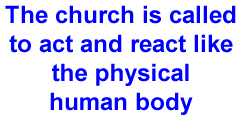Don't Keep Everything Secret
continued from Page 1
Keep it confidential!? Here the pastor has agreed to keep secret something his entire congregation should know. He allowed himself to be cornered into keeping something private that belongs not just to the Pastor, and maybe one or two Elders—the whole Body, of which they are part, should be included.
 Most likely Pete’s first response to such an idea would be sheer horror. He thinks he would be scorned and rejected, that he would be treated with disdain if he told others about his addiction.
Most likely Pete’s first response to such an idea would be sheer horror. He thinks he would be scorned and rejected, that he would be treated with disdain if he told others about his addiction.
There may be some of that, but the opposite is more likely. People are created in the image of God and that includes the wonderful God-like capacity for compassion. As a result, there is a far greater possibility that Pete would be embraced, accepted, and sympathized with than that he would be ostracized, condemned and pushed away. Human nature can be judgmental, but in the atmosphere of Jesus’ love, the opposite is more likely when honest struggles and weakness is revealed.
The Pastor here is the key to helping create the possibility of living up to Jesus’ words about “bearing each other’s burdens”. Not only can he teach and preach about bearing each other’s burdens— he can model openness and a need for support by telling some of his own fears, failures and struggles.
This may be helpful because this is not an isolated experience—it is more common than rare. Members of a church almost routinely withhold from their fellow members many of their hurts, fears, and burdens. Even their joys and accomplishments are often not shared. It is standard behavior. In our churches, privacy is the common policy.
Pete's difficult problem is not his private property if he holds membership in the body of Christ. At his birth and baptism, Pete was incorporated into the caring community of Jesus. At that time promises, spoken or implied, were made that he would be the object of their love and concern. They pledged to take care of him, to pray for him. He was their son.
In our physical body, the pain of an injured toe is immediately felt by the rest of the body, and all resources are immediately mobilized to help heal it. That is how healing happens—corpuscles, enzymes, white blood cells, and other mysterious healing helpers all flow to the injured place. Immediately healing is underway because of this incredible system.
 The church is called The Body of Christ with a definite intention that such collections of people will act and react like the physical human body. That is, when there is an injury, all parts will flow with healing resourcefulness toward the injured one.
The church is called The Body of Christ with a definite intention that such collections of people will act and react like the physical human body. That is, when there is an injury, all parts will flow with healing resourcefulness toward the injured one.
It is surprising and unfortunate that every day some of us innocently conspire to prevent The Body from taking care of its ailing parts. We do this by keeping secrets, holding on to our hurts and heartaches, insisting on privacy about the messy areas of our lives. We also contribute to that error when, like the Pastor, we agree to keep secret the hurts, concerns, worries, ills and tragedies occurring in others about whom we know.
It is a Body! No part is hurt without it affecting the rest, whether we know it or not. A cut toe is never a secret to the rest of the body. In like manner, we are expected to be open with each other about our cuts and bruises. Hurts shared will trigger love. Broken hearts draw concern and empathy. Hardships bring people’s prayers to the scene. Love, empathy and prayer are forfeited by secrecy.
The Body is denied the opportunity to flow helpfully into the pain to enable the healing process when privacy is the rule. Fear of the effects of gossip fuels the fire of the privacy obsession. Others talking about one's errors and weakness is dreaded and works as a powerful inhibitor to openness. But nothing takes the punch out of gossip like honest openness about one’s troubles and adversities. Gossip feeds on secrecy.
Of course another reason for holding back from sharing may come from another direction, such as,
“I do want others to help me but I do not want to bother them with my concerns. If it really gets heavy, I will ask for help.” Thoughtful motivation, but faulty — and an inhibitor to the belief that we should help each other.
 Not long ago one of our family members entered a very difficult divorce from her husband. We were shocked, bewildered, and frightened. It was amazing how good it was to tell our church-member friends about what was happening. Their responses were informative, enlightening, and very encouraging. Their listening and hugs healed and supported us. Without their sharing from their own lives we would have remained a lot more devastated, broken-hearted and panic-stricken. Their prayers were strengthening and healing. The whole Body came together as if they were all wounded and they rallied to give us much-needed support.
Not long ago one of our family members entered a very difficult divorce from her husband. We were shocked, bewildered, and frightened. It was amazing how good it was to tell our church-member friends about what was happening. Their responses were informative, enlightening, and very encouraging. Their listening and hugs healed and supported us. Without their sharing from their own lives we would have remained a lot more devastated, broken-hearted and panic-stricken. Their prayers were strengthening and healing. The whole Body came together as if they were all wounded and they rallied to give us much-needed support.
This approach is not risk-free. Openness does create vulnerability.
Sometimes personal information is mishandled and damage can be done. While believing in this principal of openness, it is essential to use caution. There is little risk in saying you have just been told about a malignancy. Nothing but understanding and support will bounce back for that level of sharing. Pete’s alcoholism is a step up, but relatively safe, too. So many can identify with that, somewhere in their families. Job loss, marriage struggles, delinquent youth, financial pressures, broken-heartedness, anger over mistreatment, inability to forgive, anxiety about life. All of these are prime candidates for the support, listening, acceptance, and understanding of friends and colleagues.
Be cautious to be open appropriately. Our personal sins, and those we know of others, must be kept private. When shared, they put hearers in a very difficult position where they may feel obligated to report what is going on. (This is different from sharing worries, anxieties, fears, burdens.) Examples of the un-sharable are immoral relationships and crimes like cheating or stealing.
Be discerning, as well, about the challenges or errors of people other than yourself. Confidentiality about other’s secrets is non-negotiable. We may not mention any other person's dealings or activities except with total anonymity.
But — riskiness must not stop the process! Little good happens without experimenting, trying, testing. And Christians are called to that kind of living—carefully breaking new ground.
 Gradually creating an atmosphere of safe support is a goal of enormous value. It is nurturing the Body of Christ. When the church creates an environment of bearing each other’s burdens, the blessings will far out-weigh the dangers. The risk of self revelation can be rewarded by incredible gifts of love support and acceptance.
Gradually creating an atmosphere of safe support is a goal of enormous value. It is nurturing the Body of Christ. When the church creates an environment of bearing each other’s burdens, the blessings will far out-weigh the dangers. The risk of self revelation can be rewarded by incredible gifts of love support and acceptance.
The next time Pete approaches his Pastor, the response should be something like this: “Pete, before you get into what you want to talk about, let’s discuss my reluctance to keep things to myself, and why we should consider letting others know, too.”
The Apostle Paul instructs us to “weep with those who weep” and “rejoice with those who rejoice”. Both are enormously helpful and healing, but not always easy to do.
The following are some suggestions for Christians who are working hard
at being lovingly present and supportive to others:
1. Pay rapt attention. Avoid looking around. Keep your eyes on the one talking, with appropriate nods, groans, words, and sometimes tears.
2. Express gratitude for the trust demonstrated in sharing their challenge, e.g., “Thank you for sharing this with us.”
3. Ask “how you are doing”. That is, encourage them to talk about their feelings, not just the facts. Use feeling-oriented expressions like, “Oh that must be heartbreaking,” or “That is so sad.” or “You must be feeling a lot of fear and uncertainty.” These are attempts at showing understanding and acceptance of their feelings. It is healing to be able to talk about your feelings and have others listen and accept them.
4. Avoid trying to fix. Resist all urges to give advice, remedies, solutions. You are not there to solve the problem, and usually the talker has tried most of what is needed. (There are exceptions to this rule. Occasionally a listener may have an exact needed piece of guidance that should be shared).
5. Do not go into your own story. Another’s problems almost always remind us of other people's, or ourselves, going through the same thing. Do not go there, or if you do, make it very brief like, “My brother went through that.” There is a strong temptation to move into talking about something similar to what is being shared—to tell our own story. Soon the original talker is left listening to us. Stay with this person 100%.
6. Promise prayer. And keep your promise. It is easy to say, “We will be praying for you,” and neglect to actually remember to do so.
7. After a few minutes of listening and responding, ask to be kept informed, offer to help if needed, and “move on.” In other words, most difficult conditions will repair over time and must be left to God’s healing process, therapeutic resources, and the healing community.
After listening and showing interest and compassion, “leave it to God”. This is so important. Even while deeply concerned and invested, we must avoid becoming overburdened with other’s struggles and challenges. Little undermines the “bearing each other’s burdens” theology more easily than people becoming over-burdened. Listen — and then leave it to God!
 8. Mistakes and errors in the process of being with a hurting person are usually overlooked and forgotten. Loving concern will stand out. It is more important to be present, than to be perfect.
8. Mistakes and errors in the process of being with a hurting person are usually overlooked and forgotten. Loving concern will stand out. It is more important to be present, than to be perfect.
We are called to work at making the world a better place. In all parts of life we are obliged to make it more beautiful, more efficient, more effective. Caring for each other, by building a community of openness, honesty, and acceptance of one another is part of this. This process involves modifying our attitude about life, the church, people. The change is toward ownership and away from passivity. It is taking responsibility for the organizations, and fellowship of which we are part.
Instead of just leaving things to others , which often means few or no one does anything innovative, we should nudge, tweak, suggest, urge, try to make it better. And here is a specific way we can do that.
We start modeling openness. That is, we tell about our worries, mistakes, and heartaches. In doing so, we ask for prayer and support and listening ears. We ask for help! At the same time, we commit ourselves to working hard at sensitively receiving the cries of others.
The earliest Christian communities— the first churches—grew and flourished, we now know, because of their loving-kindness to each other, and to those around them.
That is what this is all about—becoming and being more than just gatherings of acquaintances.
We must become caring communities where we truly do know each other, support and encourage one another, and live as The Body of Christ.